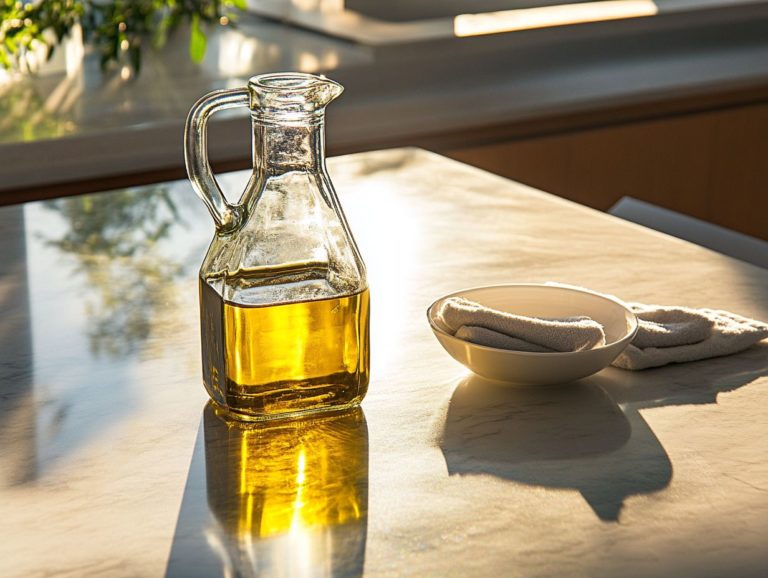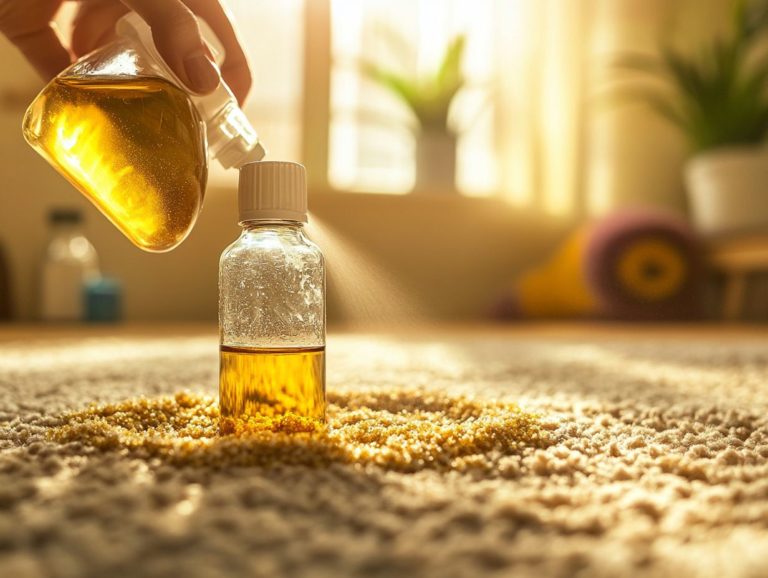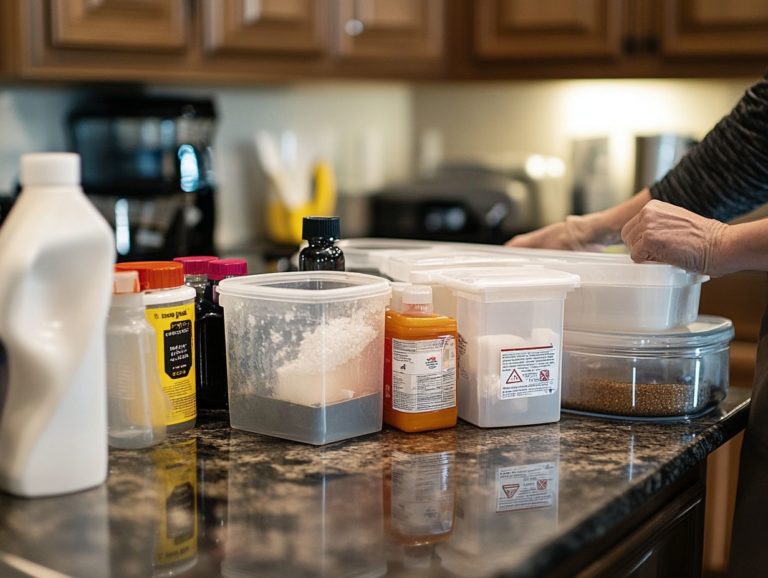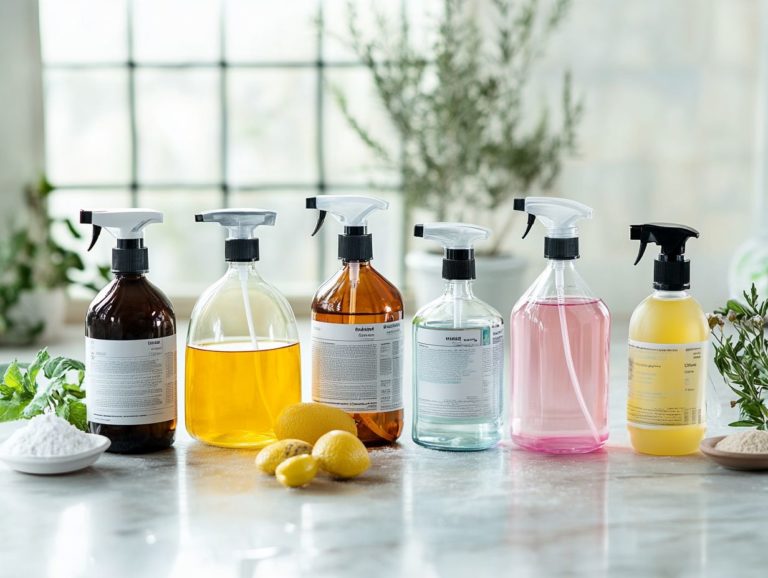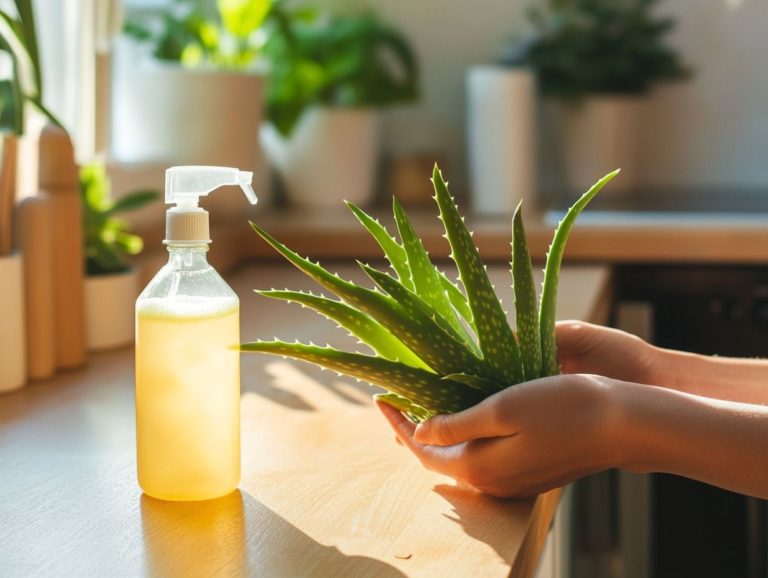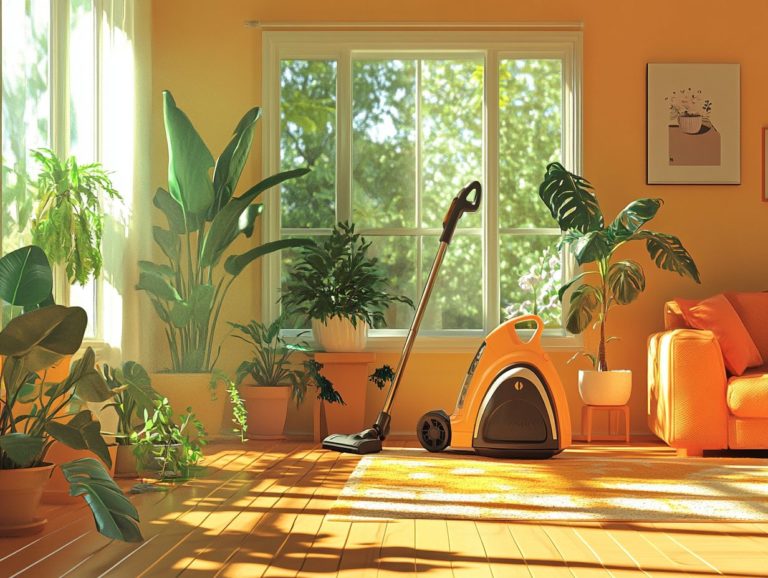What to Do If Cleaners Cause Reactions?
Cleaning products play a vital role in keeping your home pristine, yet they can cause allergic reactions or chemical sensitivity in some people.
From allergic responses to skin irritations, understanding these reactions helps protect your health. Let s dive into the common symptoms of cleaner-related allergies, see what ingredients to be mindful of, and explore practical tips to protect yourself from chemical exposure.
We will also look at safer alternatives and natural DIY solutions, including the use of natural chemicals and essential oils, ensuring you can achieve effective cleaning without jeopardizing your well-being.
Contents
- Key Takeaways:
- What Are Common Reactions to Cleaners?
- What Types of Cleaners Can Cause Reactions?
- What Are the Ingredients in Cleaners That Can Cause Reactions?
- How Can You Protect Yourself from Reactions to Cleaners?
- What Precautions Should You Take When Using Cleaners?
- What Are Safer Alternatives to Harsh Cleaners?
- What Should You Do If You Have a Reaction to a Cleaner?
- How Can You Prevent Future Reactions to Cleaners?
- What Are Some Alternatives to Using Chemical Cleaners?
- Frequently Asked Questions
- What to Do If Cleaners Cause Reactions?
- What are some common reactions to cleaners?
- What should I do if I have a reaction to cleaners?
- What if I have a severe reaction to a cleaner?
- Can I prevent reactions to cleaners?
- What should I do if I have a reaction to a specific cleaner?
- Is it safe to use cleaners if I have allergies or sensitivities?
Key Takeaways:

- Take precautions when using cleaners to avoid reactions; wear personal protective equipment (PPE) like gloves and ensure proper ventilation.
- If you experience a reaction to a cleaner, seek medical attention if symptoms are severe or persistent.
- Use natural and DIY cleaning solutions as safer alternatives to harsh chemical cleaners.
What Are Common Reactions to Cleaners?
Reactions to cleaners can differ greatly among individuals, especially for those with pre-existing conditions such as asthma or allergies.
When exposed to cleaning products filled with harsh chemicals, you may encounter allergic reactions that manifest as irritation, including skin issues and respiratory problems. In some instances, these reactions could lead to severe asthma attacks or chemical sensitivity.
Understanding these potential reactions is essential for protecting your health, particularly if you frequently use cleaning products that contain irritants like sodium hypochlorite, volatile organic compounds (VOCs) (which are chemicals that can evaporate into the air and may cause health issues), surfactants, and other hazardous materials. These substances can heighten sensitivity and result in prolonged health impacts.
What Are the Symptoms of an Allergic Reaction to Cleaners?
Symptoms of an allergic reaction to cleaners can present themselves in various ways, ranging from skin irritation to respiratory distress and other allergy-related issues.
These reactions can lead to significant discomfort, impacting your daily activities. You might notice common symptoms like itching, rashes, or redness after direct skin contact with a specific cleaning product, signaling potential skin sensitivity.
On the respiratory front, issues such as coughing, wheezing, or shortness of breath could emerge from inhaling VOCs that are often present in many household cleaners.
Chemical exposure can also lead to headaches or migraines, particularly if the cleaner contains fragrances or harsh chemicals known to trigger sensitivities. Ingredients like ammonia, bleach, formaldehyde, and preservatives frequently emerge as the usual suspects, making it important to scrutinize labels carefully, especially if you have known sensitivities.
What Types of Cleaners Can Cause Reactions?
You should be aware that certain types of cleaners are more prone to causing reactions, especially those packed with harsh chemicals or allergens, which can lead to a variety of adverse health effects.
Everyday cleaning products like bleach, sodium hypochlorite, and those high in VOCs have been linked to allergic reactions, skin irritations, and respiratory problems. While these cleaners may excel in cleaning efficacy, they often contain preservatives, allergens, and surfactants that can pose significant health risks for individuals with sensitivities or pre-existing conditions such as asthma and allergies.
This makes thoughtful product selection essential for your well-being.
Start checking your cleaning products today to ensure a safer home!
What Are the Ingredients in Cleaners That Can Cause Reactions?
You might be surprised to learn that several ingredients commonly found in cleaning products can trigger allergic reactions. Sodium hypochlorite is one of the effective disinfectants, but it can irritate your skin and respiratory system. This irritation can lead to symptoms like coughing, rashes, or even serious respiratory distress.
Surfactants, which are great for cutting through grease and grime, can also cause skin irritation and allergic reactions, especially with prolonged exposure or direct skin contact.
Preservatives may keep your products free from microbial growth, but certain ones like parabens have been linked to allergic responses. Volatile organic compounds (VOCs), on the other hand, are chemicals that can evaporate into the air and cause health issues. They are found in many cleaners and can lead to headaches, dizziness, and even long-term health issues with extensive exposure. This highlights the importance of product selection.
Given that these allergens are prevalent in everyday cleaning supplies, it’s crucial for you to read labels carefully and consider alternative, hypoallergenic options that can keep your home clean without compromising your health.
How Can You Protect Yourself from Reactions to Cleaners?
Protecting yourself from reactions to cleaning products is crucial, particularly if you have known allergies or sensitivities. Embracing cleaning safety measures, such as wearing personal protective equipment (PPE) like gloves and masks, can significantly diminish your exposure to harmful chemicals and allergens.
Choosing asthma-friendly and less irritating cleaning solutions can greatly reduce the chances of experiencing allergic reactions and irritant dermatitis. Being mindful of your environment while cleaning helps safeguard your health, minimize environmental impact, and steer clear of adverse reactions.
What Precautions Should You Take When Using Cleaners?
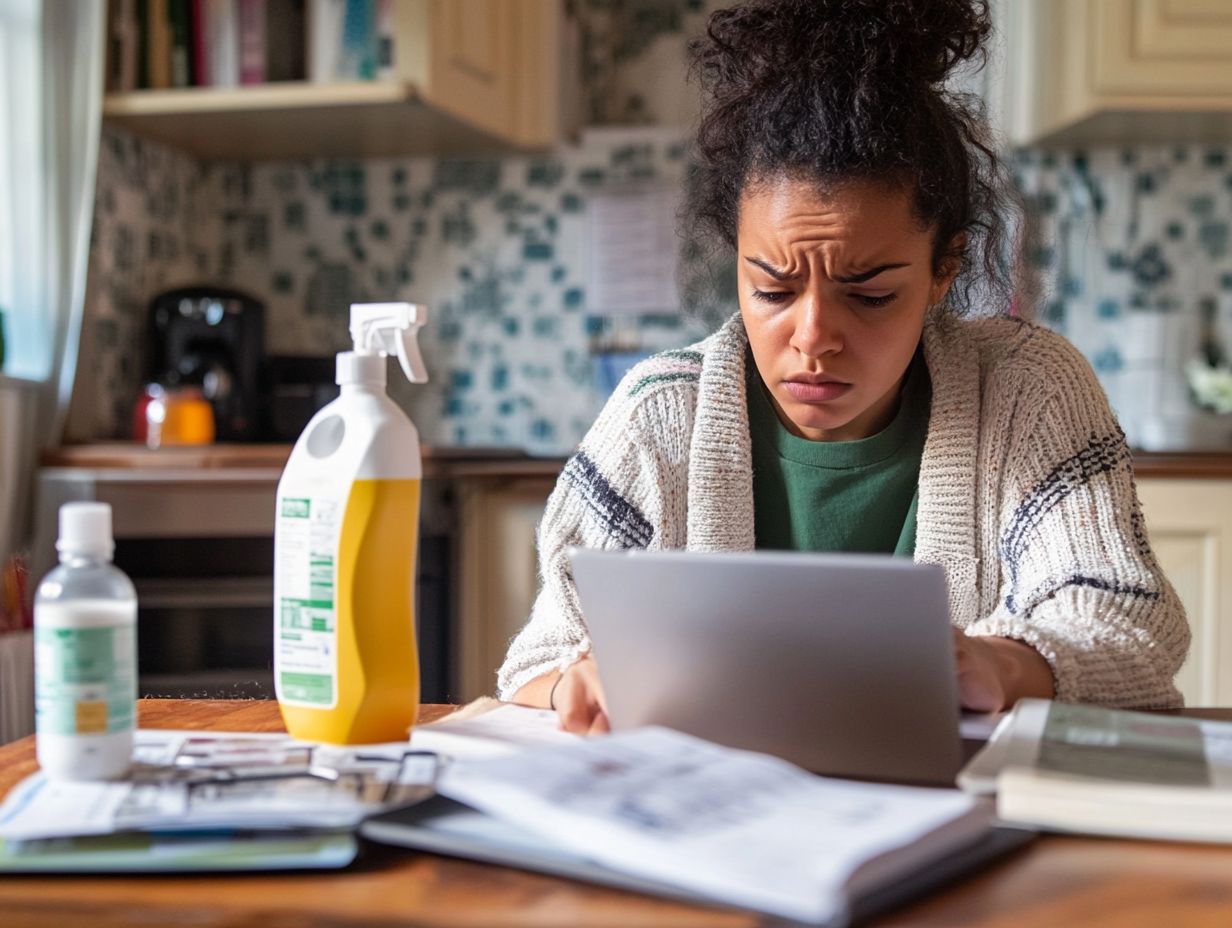
Taking precautions when using cleaners is essential to avoid potential allergic reactions and health issues related to chemical exposure.
Ensure that the area is well-ventilated by opening windows or turning on exhaust fans. Proper airflow is key to dissipating harmful fumes. Wearing gloves and other personal protective equipment is a simple yet effective measure to protect your skin from irritation and the absorption of harsh chemicals.
You should also avoid mixing different cleaning products, as this can lead to dangerous chemical reactions that pose serious health risks. Before using any product, it’s vital to read the label carefully to understand the ingredients involved and identify any allergens that may be present. Following the manufacturer’s guidelines for safe and effective usage is paramount. If you are unsure of the product’s safety, look for certifications such as Eco Logo, Green Seal, or Safer Choice.
What Are Safer Alternatives to Harsh Cleaners?
Switching to safer alternatives not only protects your health but also transforms your cleaning routine into a refreshing experience. Choosing safer alternatives to harsh cleaners can significantly reduce the risk of allergic reactions and chemical sensitivities, providing an effective method for maintaining a pristine environment.
By embracing eco-friendly and natural cleaning solutions, you can cultivate a healthier indoor atmosphere devoid of harmful toxins. For example, essential oils not only infuse your space with a delightful aroma but also provide antiseptic properties. Vinegar is a powerful disinfectant, ready to tackle grime and mineral deposits with ease, while baking soda excels at deodorizing and scrubbing surfaces without leaving scratches behind.
These alternatives reflect a commitment to sustainability and can be part of an effective cleaning regimen that ensures a safe haven for families, pets, and anyone who walks through your door.
We invite you to share your own tips for safe cleaning in the comments below to help others create a healthier home!
What Should You Do If You Have a Reaction to a Cleaner?
If you experience a reaction to a cleaner, act quickly to protect yourself! Begin by moving away from the area where the cleaning product was used.
If your skin is affected, rinse it gently with water to ease any irritation. Depending on how severe your reaction is, it may be wise to seek medical attention, especially if symptoms persist or worsen.
Understanding how to manage these reactions is essential for maintaining your health and well-being while using cleaning products.
How Can You Treat an Allergic Reaction to Cleaners?
Treating an allergic reaction to cleaners involves a mix of immediate first aid and, if needed, professional medical intervention.
If you re dealing with mild skin irritations or contact dermatitis, home remedies like cool compresses or soothing oatmeal baths can help. Over-the-counter options such as hydrocortisone creams (creams that reduce redness and itching) and antihistamines are also effective in reducing inflammation and itching. It’s crucial to identify which cleaner triggered your reaction to avoid future exposure.
If your symptoms worsen or do not improve, consult a healthcare provider, as severe reactions may require more intensive care or prescription medications. By being proactive and informed about managing your allergies, you can enhance your comfort and speed up recovery.
Consulting with specialists like Dr. Tim Yeomans, an expert in allergic reactions, can provide further insights into effective asthma management and treatments for allergic contact dermatitis.
When Should You Seek Medical Attention for a Reaction to Cleaners?
Knowing when to seek medical attention for a reaction to cleaners is vital for your health and safety, especially when severe symptoms arise.
Severe symptoms may include persistent skin irritation, respiratory distress, or other serious health effects that do not improve with initial treatment.
Immediate signs that require attention include difficulty breathing, which may come with wheezing or a feeling of tightness in the chest, and swelling in the face, lips, or throat. These could indicate an allergic reaction or asthma attack. Severe skin reactions, such as hives, rashes, blistering, or irritant dermatitis, also signal that swift treatment is necessary.
If you or someone nearby experiences these symptoms, be sure to communicate specific details to healthcare professionals. Mention the type of cleaner involved, the duration of exposure, any chemical exposure, and additional symptoms that have developed. Clear communication can significantly improve the effectiveness of the medical response, especially regarding chemical sensitivity.
How Can You Prevent Future Reactions to Cleaners?
To prevent future reactions to cleaners, adopt a proactive approach that focuses on making informed product selections and being aware of potential allergens and harmful chemicals.
By taking these steps, you can protect your well-being and create a healthier environment.
What Steps Can You Take to Avoid Reactions to Cleaners?

To avoid adverse reactions to cleaners, implement several practical steps that enhance cleaning safety and minimize chemical exposure.
- First, prioritize using personal protective equipment (PPE) such as gloves and masks. They can greatly reduce skin contact, irritation symptoms, and inhalation of harmful fumes.
- Make sure the cleaning area is well-ventilated to dilute harmful particles in the air.
- Establish a cleaning routine where less toxic cleaners and natural chemicals are used. This can further lower the risk of allergic reactions and skin irritation.
Regular cleaning keeps surfaces free of contaminants and plays a crucial role in reducing the presence of irritants, allergens, and pet dander in your environment, promoting a healthier living space for you and everyone around you.
What Are Some Common Household Cleaners That Are Less Likely to Cause Reactions?
Common household cleaners that are less likely to trigger allergic reactions typically include eco-friendly options that avoid harsh chemicals and preservatives.
These products use ingredients that prioritize your safety while ensuring effective cleaning results and minimizing environmental impact. For instance, brands like Seventh Generation and Mrs. Meyer’s Clean Day harness the power of plant-based ingredients and cleaning agents that help break down dirt and grease, making them excellent alternatives for those with sensitivities. Method products often boast biodegradable formulas that avoid known allergens.
When shopping, look for cleaners certified by the Environmental Protection Agency s Safer Choice program, Eco Logo, or Green Seal, as these have undergone rigorous testing for safety.
By choosing such eco-conscious cleaners, you can maintain a pristine home without compromising your health or comfort.
What Are Some Alternatives to Using Chemical Cleaners?
Exploring alternatives to chemical cleaners can unveil effective cleaning solutions that come without the risks tied to harmful substances, especially for those who have allergies or sensitivities.
By choosing these safer options, you can ensure a cleaner environment while prioritizing your health and well-being, reducing the risk of allergic reactions.
What Natural Ingredients Can Be Used for Cleaning?
Natural ingredients like vinegar, baking soda, and essential oils can be remarkably effective for your cleaning needs while keeping harmful chemicals and preservatives at bay.
These versatile elements not only conquer everyday messes and stubborn stains, but they also neutralize lingering unpleasant odors that can fill your home, enhancing air quality. For example, vinegar serves as a powerful deodorizer and works wonders at breaking down mineral deposits, making it perfect for cleaning surfaces in both your kitchen and bathroom.
Baking soda is another gem in your cleaning arsenal, offering gentle abrasion to lift grime while simultaneously deodorizing carpets and upholstery. Essential oils, such as tea tree or lavender, can infuse your spaces with delightful fragrances while providing antimicrobial properties, enhancing your overall cleaning experience and reducing formaldehyde and ammonia usage.
By embracing these natural alternatives, you re supporting a healthier living environment especially beneficial for those with sensitivities and allergies ensuring effective cleaning without sacrificing your air quality or well-being.
What Are Some DIY Cleaning Solutions That Are Safe and Effective?
Creating DIY cleaning solutions with natural ingredients is not just a safe bet; it s also a highly effective way to keep your home environment pristine and reduce exposure to hazardous chemicals.
More individuals are realizing that by choosing these homemade alternatives, they can significantly cut down on their exposure to harsh chemicals, solvents, and preservatives typically found in commercial products. Imagine this: ingredients like vinegar, baking soda, and essential oils can do everything from disinfecting surfaces to banishing odors, making them incredibly versatile options for any household, while avoiding solvent exposure.
For example, a simple mixture of equal parts vinegar and water can effectively tackle grime on your countertops, while a paste made from baking soda and water works wonders to scrub away stubborn stains without leaving scratches behind. Embracing these natural solutions not only cultivates a healthier living space but also benefits the planet by reducing plastic packaging and minimizing potential toxins, including volatile organic compounds (VOCs), that could leach into the ecosystem.
Frequently Asked Questions
What to Do If Cleaners Cause Reactions?

If you experience a reaction to cleaners, it is important to take immediate action to protect your health and well-being. Here are some frequently asked questions and answers to guide you.
Start exploring these natural cleaning methods today for a healthier home environment!
What are some common reactions to cleaners?
Reactions to cleaners can range from mild irritations like skin rashes and eye irritation to severe symptoms such as difficulty breathing. Always pay attention to how your body reacts after using cleaning products.
What should I do if I have a reaction to cleaners?
Stop using the product immediately and leave the area. If you experience severe symptoms, seek medical help right away.
What if I have a severe reaction to a cleaner?
For severe reactions like difficulty breathing or a serious rash, get medical attention immediately. Do not attempt to treat these symptoms on your own.
Can I prevent reactions to cleaners?
You can take steps to reduce your risk of reactions to cleaners. Wear protective gear like gloves and masks, and use products in well-ventilated areas to limit exposure to harmful chemicals.
What should I do if I have a reaction to a specific cleaner?
Check the label for ingredients that triggered the reaction and avoid similar products in the future. Consider natural or homemade cleaning alternatives, which usually have fewer harsh chemicals.
Is it safe to use cleaners if I have allergies or sensitivities?
If you have allergies, read labels closely. Avoid products with allergens like fragrance or parabens. Testing a small area before broader use can also help identify potential reactions.

